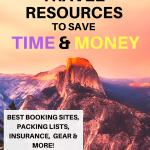Below is a list of all of the resources we personally use to help us stretch our travel dollars. Simply scroll or click on a section you want to check out below.
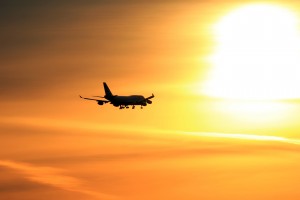
Booking Sites
Flights

Our favourite flight search engine. Skyscanner lets you search for the cheapest flights over entire months at a time, and lets you see the cheapest destinations you can fly to.

Airfarewatchdog is great for finding sale and error fares. It is led by a dedicated team of bargain hunters that post and verify deals. Their grid listings make it easy to find deals to/from cities of your choice.

Kiwi.com is the only flight search engine that finds routes from a combination of different non-partnered airlines in order to find the cheapest price from point A to B. Search across any date range, or even select a map radius as your destination.

Jetradar has great prices, and includes a lot of budget airlines that are missing from other search engines. We often use it to double check if we've overlooked low-cost fliers in a particular country.
Hotels and Hostels

AirBNB is one of the biggest game changers to happen to travel. Not only do you get the experience of living like a local in a real house or apartment, but you also save serious cash. The pricing beats hotels every time, especially if you are a group of at least 2. Use our referral code and you'll get $40 off your first booking!


The TripAdvisor hotel search engine takes the trusted hotel reviews they've collected over the years and displays them alongside results from a huge number of booking sites like Expedia and Booking.com. With the best prices and most reviews all in one place, TripAdvisor is one of the most thrifty ways to search for a hotel.

HotelsCombined is another broad hotel search engine that helps you find the best possible price amongst a huge number of booking sites. Unlike other search engines, it also includes hostels, lets you browse results on a map, and can filter results for features like wi-fi, kitchen, or gym, so you can find exactly the hotel you're looking for.
Car & RV Rentals

There are tons of different car rental sites out there, and any one of them may offer the best price, depending on the areas and dates you are looking at. Booking Buddy is great because it allows you to search across many different car rental sites at once, ensuring you find the best price every time.
 If you're looking to rent an RV or campervan, Outdoorsy is the best option. A standard RV rental company can charge thousands in daily rates, mileage, and add-ons, but Outdoorsy is the Airbnb of RV rentals, letting you rent RVs directly from the owners at a fraction of the price. Each booking includes insurance and 24/7 roadside assistance, and vehicles are available worldwide.
If you're looking to rent an RV or campervan, Outdoorsy is the best option. A standard RV rental company can charge thousands in daily rates, mileage, and add-ons, but Outdoorsy is the Airbnb of RV rentals, letting you rent RVs directly from the owners at a fraction of the price. Each booking includes insurance and 24/7 roadside assistance, and vehicles are available worldwide. Kayak is another broad car rental search engine, combining results from a variety of travel providers to find you the best price. This is the last site we check if we want to be sure we've found the best price.
Kayak is another broad car rental search engine, combining results from a variety of travel providers to find you the best price. This is the last site we check if we want to be sure we've found the best price.Tours

Viator (owned by TripAdvisor) is our go-to site for booking tours and attraction tickets. Rather than browsing dozens of websites and exchanging phone calls and e-mails to book, just browse the tours on Viator, pay online, and immediately receive your tour voucher, which you can print or display on your smartphone. Viator has a low price guarantee, so if you find a better price online for the same tour, they'll refund you the difference.
GetYourGuide has similar benefits to Viator – browse and pay online, and conveniently receive your voucher via e-mail, which you can print or display on your smartphone. However, GetYourGuide has a different selection (and different prices) than Viator, so it's worth comparing the two if you want to ensure you get the best price.
Trip Planning
One of the best ways to save money on a trip is to plan it yourself. You'll also be more likely to dodge tourist traps and have an authentic experience. Here's the tools we use to plan our own trips!

When it comes to trip planning, we still believe that nothing beats a Lonely Planet travel book. We're big believers in planning your own trip, and a guide book is a great place to begin with itinerary ideas, plus inform yourself on some of the top or lesser known attractions, hikes, and more. If you're short on space, you can always buy the e-book too!
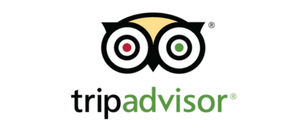
When it comes to choosing a hotel, restaurant, tour, or anything where you're going to be spending money, TripAdvisor is still the best place to get reviews and opinions. Don't just blindly walk up to the first thing you see on a touristy street – do your research!
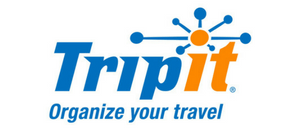
Tripit is a useful tool that will automatically put together your travel itinerary based on the booking confirmations you get via e-mail for your flight and hotel reservations. Just start forwarding your confirmations to [email protected], and you'll automatically get a full itinerary that you can access from your laptop or smartphone, and even share with friends and family. Of course, if you need to manually edit your itinerary, you can do that too.
Money
In general, you want a few cards to bring (not just one – in case it gets lost!). Fee-free currency conversion, a good points or cashback program, and ideally one Visa and one Mastercard (some countries only accept one or the other).
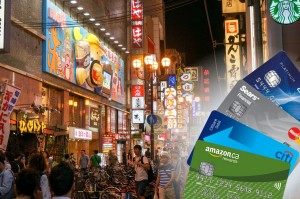 The most cost-effective ways to convert your money while travelling are, in order:
The most cost-effective ways to convert your money while travelling are, in order:
- A (cashback/points) credit card with 0% currency conversion fees
- ATM withdrawals using a card with no international withdrawal fees
- As a last resort, converting your money at an exchange booth.
The card that you should use depends on the country you're from, so check out our full guide on the best travel credit and debit cards for the full rundown!
Gear
Luggage
The type of luggage we use depends on the length of trip and where we are going. These are the bags we choose from.

This Deuter 28 Litre Backpack is all we used on our first 6-month trip around the world. It's not for everyone – you'll need to pack lighter than ever before! But if you plan to do a lot of hiking or camping, take a lot of buses, or fly with carry-on baggage only, this could be the bag for you.

Nowadays, we like having a bit more space for clothes and things we might want to purchase, so we typically travel with the Deuter ACT Lite 40+10. With openings at both the top and the bottom and lots of compartments, there's more than enough space while still travelling light.

When you don't need to move around much, nothing beats the convenience of a suitcase. You can easily pull it on wheels, organize in compartments, and open it up to see your entire wardrobe at once. A good choice for a short or slow-paced trip. But not very practical for tiny buses or long treks! Our favourite brands are SwissGear and Heys.
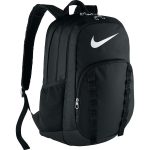 In addition to our main luggage, we always have a day bag for carrying our camera, water bottles, jackets, and anything else we need for the day. We use a Nike backpack for this. We've bought cheaper bags before only to have them break from overloading. It's worth investing in a sturdy day bag to secure your belongings.
In addition to our main luggage, we always have a day bag for carrying our camera, water bottles, jackets, and anything else we need for the day. We use a Nike backpack for this. We've bought cheaper bags before only to have them break from overloading. It's worth investing in a sturdy day bag to secure your belongings.
Specialty Travel Gear
 We each carry a PackTowl. This is super compact and dries quickly, so once it's wet, you don't have to leave it out long before you can pack up and head to your next destination.
We each carry a PackTowl. This is super compact and dries quickly, so once it's wet, you don't have to leave it out long before you can pack up and head to your next destination. We use this compact spork set for packed lunches and snacks. Super convenient for any kind of meal!
We use this compact spork set for packed lunches and snacks. Super convenient for any kind of meal! After greatly exceeding our luggage limits and throwing out half our luggage at the airport, we've learned our lesson. Now we always weigh our bags ahead of time using a luggage scale.
After greatly exceeding our luggage limits and throwing out half our luggage at the airport, we've learned our lesson. Now we always weigh our bags ahead of time using a luggage scale. 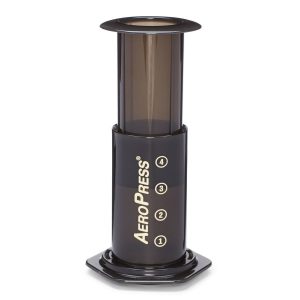 Even if you aren't travelling, the AeroPress has a cult following amongst coffee lovers for the delicious taste it produces in just minutes of preparation. Thankfully, it's compact, so we can travel around the world without relying on instant.
Even if you aren't travelling, the AeroPress has a cult following amongst coffee lovers for the delicious taste it produces in just minutes of preparation. Thankfully, it's compact, so we can travel around the world without relying on instant.  When packing light, every inch counts. So the Platypus water bottle is a great way to save some space. It's a fully functional water bottle, but when it's empty, you can fold it up to almost nothing at all. And with the built-in carabiner hook, it's easy to hang off of your backpack.
When packing light, every inch counts. So the Platypus water bottle is a great way to save some space. It's a fully functional water bottle, but when it's empty, you can fold it up to almost nothing at all. And with the built-in carabiner hook, it's easy to hang off of your backpack.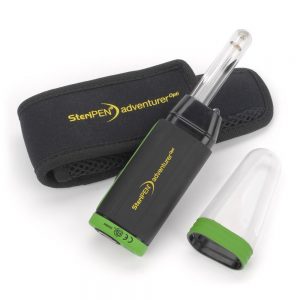 If you’re travelling in a region where water contamination is a risk, a portable water sterilizer can prevent wasting money and water bottles. It’s not a cheap purchase, but with over 8,000+ uses per battery life, it will pay itself off. It will also prevent you from getting waterborne illnesses – sickness is always well worth avoiding! (For more tips on preventing food and waterborne illness when travelling, check our pro tips here).
If you’re travelling in a region where water contamination is a risk, a portable water sterilizer can prevent wasting money and water bottles. It’s not a cheap purchase, but with over 8,000+ uses per battery life, it will pay itself off. It will also prevent you from getting waterborne illnesses – sickness is always well worth avoiding! (For more tips on preventing food and waterborne illness when travelling, check our pro tips here).Photo Backup
 What's worse than having your camera lost or stolen while on a trip? Losing all the photos that were stored on it. That's why we backup our photos religiously while we're on the road. We use Backblaze, which will backup an unlimited number of files on your laptop automatically over the internet, even the ones on an external hard drive! You can even access the files from the free mobile app. Recently, our external hard drive with all of our travel photos for the past 3 years decided to die, but we were able to recover everything thanks to our online backup. If you are only travelling with a phone and not a laptop, consider using iCloud Photo Library (iPhone and Mac) or Google Photos (Android + iPhone) to automatically back up your photos from your phone every time you're on wi-fi.
What's worse than having your camera lost or stolen while on a trip? Losing all the photos that were stored on it. That's why we backup our photos religiously while we're on the road. We use Backblaze, which will backup an unlimited number of files on your laptop automatically over the internet, even the ones on an external hard drive! You can even access the files from the free mobile app. Recently, our external hard drive with all of our travel photos for the past 3 years decided to die, but we were able to recover everything thanks to our online backup. If you are only travelling with a phone and not a laptop, consider using iCloud Photo Library (iPhone and Mac) or Google Photos (Android + iPhone) to automatically back up your photos from your phone every time you're on wi-fi.
Blogging

You're going to want a website powered by WordPress, and you're going to need a web host. SiteGround comes highly recommended by many travel bloggers. You can setup WordPress in just a few minutes with your own personalized URL/domain name, and if you have any issues, a friendly support team is just a few clicks away.

There are countless WordPress plugins out there for your blog, but the first one you should install is Jetpack. You can start for free, but for as low as $3.50/month, you get unlimited daily backups of your blog and additional spam and security protection. Losing your blog's content would be a nightmare, as would having a hacked website infecting your visitors, so this very small investment is well worth the peace of mind!
 Ready to take your blog seriously and start making money? Nomadic Matt's Superstar Blogging course offers easily digestible information that is spot on in accuracy. From understanding how to really monetize your blog (especially with affiliates, which we primarily use), to crafting your writing skills (again, huge fans of this!) – everything that an aspiring blogger needs to know is provided here. You also get access to a private Facebook group where you can ask questions and share knowledge with other bloggers, even some of the biggest bloggers out there!
Ready to take your blog seriously and start making money? Nomadic Matt's Superstar Blogging course offers easily digestible information that is spot on in accuracy. From understanding how to really monetize your blog (especially with affiliates, which we primarily use), to crafting your writing skills (again, huge fans of this!) – everything that an aspiring blogger needs to know is provided here. You also get access to a private Facebook group where you can ask questions and share knowledge with other bloggers, even some of the biggest bloggers out there! 

